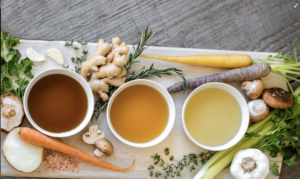Get the Most out of your Collagen Supplement
Collagen is the most plentiful protein in your body. It’s in your muscles, bones, tendons, ligaments, organs, blood vessels, skin, intestinal lining, and other connective tissues1. Think of collagen as the glue that holds your body together!
For years, I’ve been using collagen as a functional food supplement in my tea, coffee, soups, smoothies, and stews. I’ll put it in chia pudding and oatmeal and egg dishes. I try to sneak extra protein into my kids’ food whenever possible and collagen is an easy, tasteless way to do that. Literally, it tastes like nothing! It’s my favorite “protein powder” and it even comes in vanilla and chocolate flavors for coffee and smoothies.
I stopped drinking my morning chai tea for a few months and therefore stopped taking my collagen powder. I’m not kidding, I saw a noticeable difference in my skin. And not a good difference! My hands and arms quickly lost elasticity and got wrinklier. When I added the collagen back in, my skin’s elasticity was restored within a few days. I still have 39-year-old skin, mind you. It’s just not looking like 49-year-old skin anymore. Yeah, collagen!
Making collagen naturally
Incorporating certain foods into your diet supports the body’s natural production of collagen. Focus on protein-rich foods like beef, chicken, fish, beans, eggs, and dairy. These foods contain the amino acids that make up collagen, namely glycine, proline, and hydroxyproline2.
Collagen production requires certain nutrients!
In addition to these amino acids, the body also requires certain nutrients, like vitamin C, zinc, and copper, to ensure adequate collagen production is taking place. Incorporating these vitamin and mineral rich foods is incredibly important. You can find vitamin C in citrus fruits, berries, leafy greens, bell peppers, and tomatoes. Minerals zinc and copper can be found in animal proteins, shellfish, nuts, seeds, whole grains, and beans.
In food, collagen is naturally found in animal flesh like meat and fish that contain connective tissue.
With that being said, the richest forms of collagen are found in the connective tissue of animals and skin and bones of fish. Today, most people only eat muscle meat proteins, which do not give us adequate collagen or the amino acids that we need to help repair and restore our bodies3.
Bone broth is an excellent source of collagen.
A great addition to your diet to increase collagen consumption and production is bone broth! Bone broth is made from a variety of meaty joints and bones, simmered for an extensive period of time, and typically sipped on its own as a restorative tonic.
Bone broth is rich in amino acids (the building blocks of protein) that boast anti-inflammatory properties, support the immune system, joint health, and collagen production.
Supplementing with collagen peptides
Supplementing with collagen peptides helps to replenish the body’s collagen supply. Collagen peptides are short-chain amino acids that are absorbed by the bloodstream to repair, rebuild, and restore our hair, skin, nails gut, bones, and joints.
Collagen peptides are tasteless and textureless and will blend into all foods and beverages. When purchasing collagen peptides, ensure the bovine source is grass-fed and marine source is wild-caught.
Simply incorporate the peptides by adding it to your coffee, tea, oatmeal, soup, or smoothie! You can find lots of easy, healthy ways to use collagen below. While collagen naturally degrades as we age, additional lifestyle and environmental factors can negatively affect our overall collagen production. Incorporating nutrient-dense whole foods, with a focus on high-quality protein, is a sure-fire way to support and protect your body’s natural collagen production. Check out my recipes below and let me know how your skin is looking in a few weeks!






